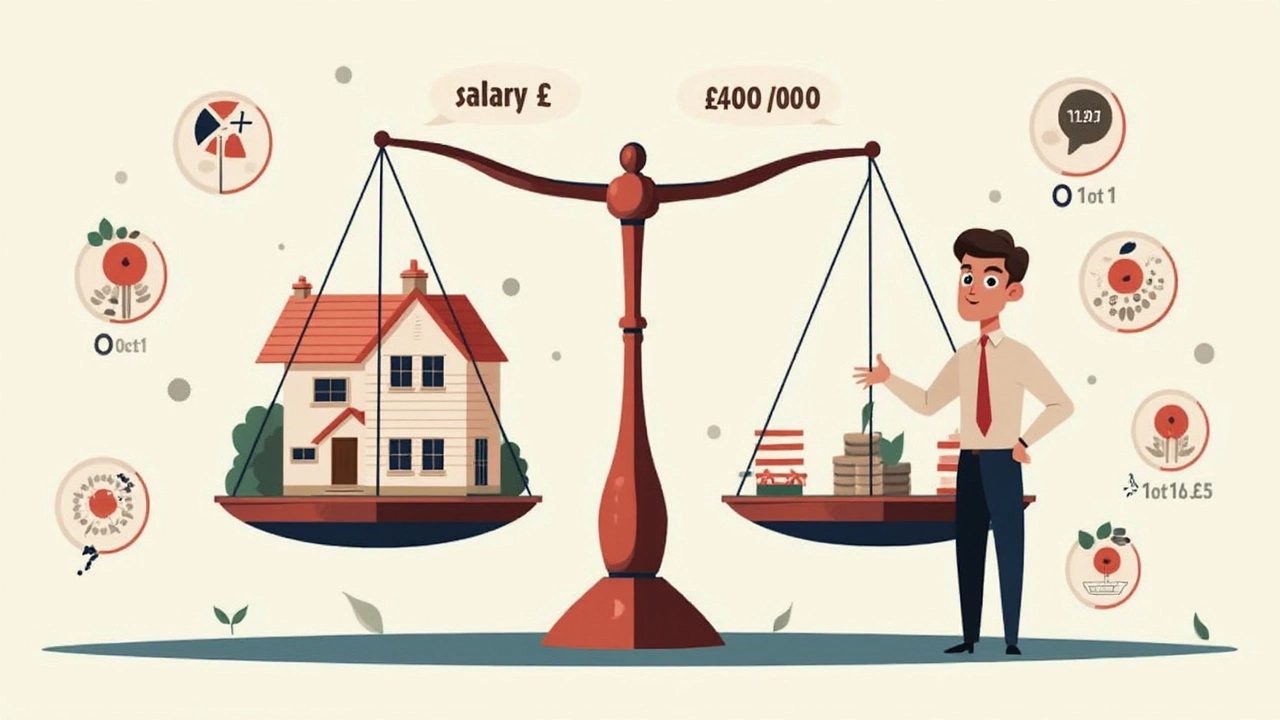Ever tried to guess how much home you can actually afford with a $70,000 salary? You’re not alone—this is one of the first big questions every first-time homebuyer faces. The good news? There are clear formulas and some inside tricks you can use to figure this out before you even talk to a lender.
Banks have pretty simple rules: they mostly care about your annual income, how much debt you’re already carrying (think car loans, credit cards), your credit score, and how much cash you can put down up front. On a $70,000 salary, most lenders figure you can safely spend somewhere between 28% and 36% of your monthly income (that’s $1,633 to $2,100 a month) on all housing costs—including the mortgage, insurance, and taxes.
If you don’t have big monthly debts, your mortgage preapproval could land you in the ballpark of $270,000 to $330,000. But don’t anchor yourself to the high end—other things like your credit score or location (hello, property taxes!) will push that number up or down. And don’t forget: the bigger your down payment, the better your options.
- What Lenders Look For
- Crunching the Numbers: Mortgage Estimates
- Monthly Payments and What Impacts Them
- Boosting Your Approval Odds
- Tips for First-Time Homebuyers
What Lenders Look For
Lenders have a checklist they go through every single time someone applies for a home loan. Before they give you the green light, they want to be sure you can handle the monthly payments, not just today, but for the long haul. And their approach is way more numbers-focused than you might think.
Here’s the kind of stuff that’s at the top of their list:
- Income: They want to see steady paychecks, usually for at least two years at the same job or in the same line of work. Your $70,000 salary counts a lot, but bonuses and overtime can also help.
- Debt-to-Income Ratio (DTI): This is a big one. They add up all your monthly debt payments (like car notes, student loans, and credit cards) and compare that with your monthly income. Most lenders cap DTI at 36%–43%. The lower, the better—it shows you have headroom for more payments.
- Credit Score: If your credit’s over 740, you’ll snag the lowest rates. Anything above 680 is still decent. Under 620? Things get a lot trickier, though some programs for first-time buyers accept lower scores.
- Down Payment: The more cash you can lay down, the stronger your application. Putting 20% down lets you dodge private mortgage insurance (PMI), but even 3%–5% can work for first-timers using special programs.
- Cash Reserves: Lenders like when you have some money in savings after closing to cover emergencies. Two or three months’ worth of mortgage payments is a typical ask.
- Property Type: Single-family homes are easiest to finance. Condos or duplexes sometimes come with more rules and paperwork.
Ever wonder how all these details play out in real life? Here’s a quick breakdown of sample loan requirements based on known guidelines for first-time buyers in the U.S.:
| Factor | Conventional Loan | FHA Loan | VA Loan |
|---|---|---|---|
| Minimum Credit Score | 620 | 580 | None (but 620+ preferred) |
| Minimum Down Payment | 3% | 3.5% | 0% (for qualified vets) |
| Max DTI Ratio | 43% | 50% | 41% |
| Cash Reserves | 2-6 months | None (most cases) | None (most cases) |
The mortgage calculator comes in handy here—it helps you estimate your true borrowing power in seconds, using all these factors. Bottom line: if you know what lenders want, you’re already ahead of most first-time buyers.
Crunching the Numbers: Mortgage Estimates
Banks don't guess when they decide how much you can borrow—they use hard numbers. If you make $70,000 a year, that’s about $5,833 a month before taxes. Lenders typically won’t let your total monthly housing costs go much higher than 36% of your gross monthly income.
Here's the math: 36% of $5,833 equals about $2,100 each month. But that has to cover everything—mortgage payment, property taxes, and homeowner's insurance. So the chunk that goes just to your loan (the principal and interest) is usually a bit less.
Let's break it down with a realistic example. If you have no major debt (student loans, car loans, or high credit card balances), you’re in the sweet spot. Using a common rule, with a 7% interest rate (a typical rate in early 2025), a 30-year loan, and 5% down, you can afford a house around $290,000 to $310,000. That’s not a guess—that’s just what the monthly payment math lines up with.
| Home Price | Down Payment (5%) | Loan Amount | Est. Monthly Payment | Needed Salary |
|---|---|---|---|---|
| $280,000 | $14,000 | $266,000 | $1,995 | $70,000 |
| $300,000 | $15,000 | $285,000 | $2,140 | $75,000 |
| $320,000 | $16,000 | $304,000 | $2,285 | $80,000 |
Notice how a bump in the home price means you’ll need a bigger salary if you don’t want lenders to say no. If you want a bigger mortgage, you’ll need either a bigger down payment or lower other debts to offset that higher monthly payment.
And here’s a pro tip: Using a mortgage calculator online (like NerdWallet, Rocket Mortgage, or your bank’s) with these numbers will show you exactly where your comfort zone is. Change the loan term, mess with the interest rate, and see how it impacts your affordable home price—it’s all about what monthly payment fits your budget and gets lender approval.

Monthly Payments and What Impacts Them
You probably care more about the monthly payment than the top-line mortgage amount. So what actually goes into that bill? It’s not just the loan—it’s a combo of the principal, interest, property taxes, homeowners insurance, and sometimes private mortgage insurance (PMI) if you don’t put down at least 20%.
Let’s break down how these parts usually stack up. For first-time buyers on a $70,000 salary, here’s a ballpark of what monthly costs might look like if you snagged a $300,000 mortgage with a 7% fixed interest rate on a 30-year term. Most folks fall somewhere in this range right now.
| Component | Monthly Cost (Example) |
|---|---|
| Principal & Interest | $1,996 |
| Property Taxes | $300 |
| Homeowners Insurance | $90 |
| PMI (if down payment < 20%) | $120 |
| Total | $2,506 |
Now, a few things cause this number to change:
- Mortgage calculator inputs depend a lot on your interest rate. Smaller rate = lower payment, even if the home price is the same.
- Down payments matter. If you toss in 20% or more, you skip PMI and chop a chunk off your monthly payment.
- Property taxes swing wildly based on where you buy. In Texas, they can be double what you’d pay in Tennessee.
- Credit scores affect interest rates. Better score = lower rate and smaller monthly payment.
Real-life tip: Lenders want your total monthly debt (including the new mortgage) to stay under 43% of your gross monthly income. On a $70,000 salary, that means keeping your housing and other debts under about $2,508 a month. Go over that, and you’ll either get a smaller loan offer or a big "no thanks." Run your numbers and play with a few online calculators to see what fits your budget, not just what the bank offers.
Boosting Your Approval Odds
So you know your numbers—but what if you want to give yourself the best shot at snagging a good mortgage on your $70,000 salary? Lenders take a hard look at the whole package. Here’s how you can tip the scales in your favor.
The backbone of your approval is your credit score. According to Experian, most lenders look for a score of at least 620, but “borrowers with scores above 740 usually qualify for the lowest interest rates.” Every few points above that base matters. Try pulling your free credit reports and check for errors—fixing even small mistakes can quickly bump your score.
If you take steps to boost your credit score, you can qualify for thousands more in borrowing power and pay less every month. – NerdWallet (2024)
Next, watch your debt-to-income ratio (DTI). This is a fancy way of asking: how much of your paycheck is already locked up by loans and credit cards? Most lenders prefer your DTI under 43%, but shooting for 36% or lower makes you look like less of a risk.
Down payment is another lever. The more you can put down—think 20% if possible—the less risky you appear and the more programs you can access (including avoiding private mortgage insurance, or PMI). If you’re struggling to save up, look into first-time buyer programs and grants. FHA loans let you go as low as 3.5% down if your credit’s good.
| Factor | Stronger Profile | Weaker Profile |
|---|---|---|
| Credit Score | 740+ | under 620 |
| Down Payment | 20%+ | Below 5% |
| DTI Ratio | 36% or less | Over 43% |
| Job History | 2+ years, stable | Frequent changes, gaps |
Job history matters too. Lenders want to see you’ve been earning steady pay, ideally for two years or more with no big gaps. Even a tight resume counts for more than a high salary if your income changes every few months.
In short, tidy up your credit, save as much as you can for that down payment, cut down old debts, and keep your job steady. That’s what pushes your application from maybe to yes.

Tips for First-Time Homebuyers
Trying to buy your first place on a $70,000 salary can be a mixed bag—exciting, but way easier if you know what to expect. Here’s some practical advice that really makes a difference:
- Get pre-approved early. This shows sellers you’re serious. It also gives you a clear price range based on what you can borrow, not just what you want to spend.
- Don’t skip first-time buyer programs. Many states have grants or down payment assistance—sometimes up to $15,000 just for folks who haven’t owned in the last three years. These can stack onto whatever you save yourself.
- Keep an eye on your debt-to-income (DTI) ratio. Lenders usually want your total debts to be less than 43% of your paycheck. If you’re close to that, paying off a small loan or credit card can bump up your approval limit.
- Shop around for rates. Even a 0.25% lower rate can save you thousands over the mortgage life. Many first-timers forget some banks or credit unions will beat their competitor just to win your business.
- mortgage calculator tools are a game-changer. Plug your real numbers (salary, debts, down payment) into a few online calculators before house hunting. The estimates are usually spot-on within a couple thousand dollars.
Here’s a snapshot of the kind of numbers you might see on a $70,000 salary (assuming 7% interest, 30-year fixed rate, no big existing debts):
| Down Payment | Home Price You Can Afford | Estimated Monthly Payment |
|---|---|---|
| $10,000 | $265,000 | $1,910 |
| $20,000 | $280,000 | $2,020 |
| $40,000 | $310,000 | $2,237 |
One last tip—budget for the real costs, not just the sticker price. Add up taxes, insurance, HOA fees, and anything else local to your area. These can easily run a few hundred dollars extra each month, catching people off-guard if they only look at the loan payment. Being prepared keeps you from getting in over your head and lets you enjoy the whole home-buying ride a lot more.


Corbin Fairweather
I am an expert in real estate focusing on property sales and rentals. I enjoy writing about the latest trends in the real estate market and sharing insights on how to make successful property investments. My passion lies in helping clients find their dream homes and navigating the complexities of real estate transactions. In my free time, I enjoy hiking and capturing the beauty of landscapes through photography.
view all postsWrite a comment